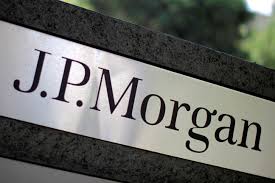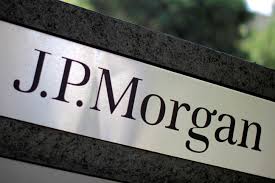
After the largest U.S. bank's first-quarter profits fell 42 per cent, Chief Executive Jamie Dimon warned of economic uncertainty stemming from Russia's invasion of Ukraine and rising inflation.
JPMorgan had recorded a record profit in the first quarter of last year, profiting from a dealmaking boom as the Federal Reserve pushed liquidity into capital markets to counteract the COVID-19 pandemic's economic impact.
Investment banking revenues, on the other hand, fell this year as corporations postponed takeovers and stock market debuts amid a spike in equities market volatility. In addition, the bank set aside $902 million to cover possible loan losses.
JPMorgan is considered a bellwether for the US economy, and its dismal results set the tone for Wall Street banks' first-quarter earnings as the Fed seeks to reign in inflation and the trading windfall banks enjoyed during the pandemic fades.
"Inflation and Ukraine are powerful forces that threaten the economy," Dimon said on a call with media, underscoring a change in his bullish outlook for the U.S. economy.
"The Fed needs to try to manage this economy and try to get to a soft landing, if possible."
When asked if the United States might be in for a recession, Dimon said: "I'm not expecting a downturn. Is that even possible? Absolutely."
In midday trading, JPMorgan shares were down 2.8 per cent. Other bank stocks have also dropped. Citigroup and Bank of America both lost 0.9 per cent of their value.
The Common Equity Tier 1 (CET1) ratio of JPMorgan Chase & Co. decreased to 11.9 per cent in January from 13.1 per cent in December. Analysts believe this will limit the company's ability to buy back shares.
Chief Financial Officer Jeremy Barnum told analysts that the bank will buy back fewer stock this year than in 2021.
When asked about the year ahead, Dimon stated there were "storm clouds on the horizon," including the conflict in Ukraine, which Russia refers to as a "special military operation."
"Usually wars don't necessarily affect the global economy in the short run. But there are exceptions to that. This may very well be one of them," he said.
According to Christopher Marinac, research director at Janney Montgomery Scott, Dimon's tone on the economy was less upbeat than in the past, which weighed on the stock.
"Jamie is one of those people who will tell you what you need to hear, not necessarily what you want to hear," he said. "A lot of people want to hear that everything is fine and he's not telling you that."
Analysts said trading was higher than expected, although it was still down 3 per cent from a record quarter last year.
Increased volatility is expected, according to Dimon, which bankers believe will be beneficial to Wall Street trading desks.
"There is almost no chance you won’t have volatile markets, that can be good or bad. But I think people should be prepared for that," he said.
JPMorgan's investment banking revenue fell by 28 per cent in the first quarter, resulting in a 5 per cent decline in net revenue to $30.72 billion. Markdowns on Russia-linked derivatives also contributed to the drop.
Investment banking fees fell 32 per cent to $2.01 billion, thanks to a 69 per cent drop in equity underwriting costs. When compared to the previous year, the number of agreements in which JPMorgan participated as a bookrunner decreased by 39 per cent.
The top banks in the United States are reporting earnings at a time when inflation is on the rise, which could prompt the Federal Reserve to raise interest rates more forcefully this year.
While this can help large lenders by boosting the amount of money they receive from loans, quick rate hikes could stifle the economy and halt the pandemic's recovery.
JPMorgan's core banking activities, excluding the markets division, saw a 9 per cent growth in net interest income year over year. According to the bank, that sum will be more than $53 billion in 2022, which is approximately in line with its February forecast.
JPMorgan stated that its full-year spending will rise by almost 10 per cent.
Market revenue came in stronger than expected, falling 3 per cent to $8.8 billion, with fixed income trading down only 1 per cent from last year's record highs.
Citigroup and Goldman Sachs , two other prominent U.S. banks, will announce results on Thursday.
(Source:www.reuters.com)
JPMorgan had recorded a record profit in the first quarter of last year, profiting from a dealmaking boom as the Federal Reserve pushed liquidity into capital markets to counteract the COVID-19 pandemic's economic impact.
Investment banking revenues, on the other hand, fell this year as corporations postponed takeovers and stock market debuts amid a spike in equities market volatility. In addition, the bank set aside $902 million to cover possible loan losses.
JPMorgan is considered a bellwether for the US economy, and its dismal results set the tone for Wall Street banks' first-quarter earnings as the Fed seeks to reign in inflation and the trading windfall banks enjoyed during the pandemic fades.
"Inflation and Ukraine are powerful forces that threaten the economy," Dimon said on a call with media, underscoring a change in his bullish outlook for the U.S. economy.
"The Fed needs to try to manage this economy and try to get to a soft landing, if possible."
When asked if the United States might be in for a recession, Dimon said: "I'm not expecting a downturn. Is that even possible? Absolutely."
In midday trading, JPMorgan shares were down 2.8 per cent. Other bank stocks have also dropped. Citigroup and Bank of America both lost 0.9 per cent of their value.
The Common Equity Tier 1 (CET1) ratio of JPMorgan Chase & Co. decreased to 11.9 per cent in January from 13.1 per cent in December. Analysts believe this will limit the company's ability to buy back shares.
Chief Financial Officer Jeremy Barnum told analysts that the bank will buy back fewer stock this year than in 2021.
When asked about the year ahead, Dimon stated there were "storm clouds on the horizon," including the conflict in Ukraine, which Russia refers to as a "special military operation."
"Usually wars don't necessarily affect the global economy in the short run. But there are exceptions to that. This may very well be one of them," he said.
According to Christopher Marinac, research director at Janney Montgomery Scott, Dimon's tone on the economy was less upbeat than in the past, which weighed on the stock.
"Jamie is one of those people who will tell you what you need to hear, not necessarily what you want to hear," he said. "A lot of people want to hear that everything is fine and he's not telling you that."
Analysts said trading was higher than expected, although it was still down 3 per cent from a record quarter last year.
Increased volatility is expected, according to Dimon, which bankers believe will be beneficial to Wall Street trading desks.
"There is almost no chance you won’t have volatile markets, that can be good or bad. But I think people should be prepared for that," he said.
JPMorgan's investment banking revenue fell by 28 per cent in the first quarter, resulting in a 5 per cent decline in net revenue to $30.72 billion. Markdowns on Russia-linked derivatives also contributed to the drop.
Investment banking fees fell 32 per cent to $2.01 billion, thanks to a 69 per cent drop in equity underwriting costs. When compared to the previous year, the number of agreements in which JPMorgan participated as a bookrunner decreased by 39 per cent.
The top banks in the United States are reporting earnings at a time when inflation is on the rise, which could prompt the Federal Reserve to raise interest rates more forcefully this year.
While this can help large lenders by boosting the amount of money they receive from loans, quick rate hikes could stifle the economy and halt the pandemic's recovery.
JPMorgan's core banking activities, excluding the markets division, saw a 9 per cent growth in net interest income year over year. According to the bank, that sum will be more than $53 billion in 2022, which is approximately in line with its February forecast.
JPMorgan stated that its full-year spending will rise by almost 10 per cent.
Market revenue came in stronger than expected, falling 3 per cent to $8.8 billion, with fixed income trading down only 1 per cent from last year's record highs.
Citigroup and Goldman Sachs , two other prominent U.S. banks, will announce results on Thursday.
(Source:www.reuters.com)














